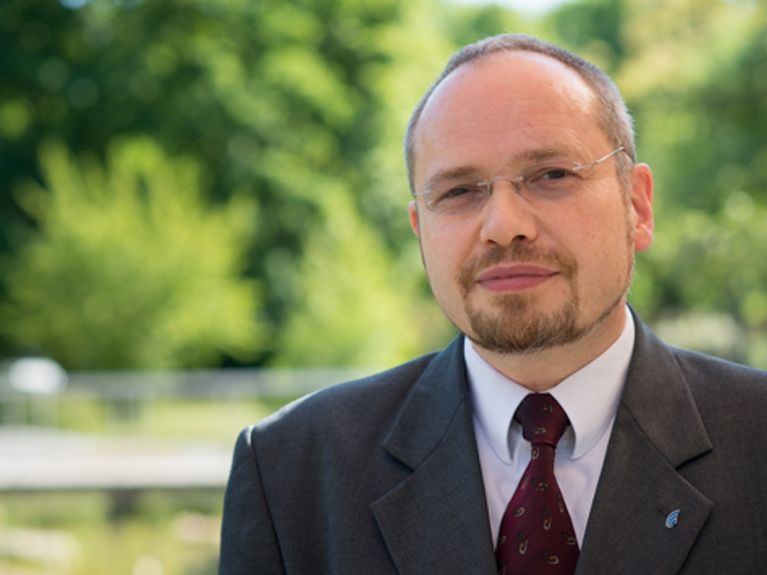Portrait
“We are in it for the long haul”

Photo: Sebastian Wiedling/UFZ
How can we deal sparingly with environmental resources such as water, fossil fuels, or wood? How are we supposed to manage the energy transition? Like leitmotifs – these issues crop up again and again in the daily work routine of Erik Gawel at the Helmholtz Centre for Environmental Research (UFZ).
For Erik Gawel, the Helmholtz Centre for Environmental Research (UFZ) is an ideal location. Not only because it gives the appearance of an idyllic biotope on the campus of the Science Park Leipzig with its wild bushes and grasses all around a fire pond; rather, it’s mostly because different scientists from numerous disciplines – in seven subject areas and 37 departments – jointly pursue essential research issues and projects.
How can we, carefully and without waste, deal with environmental resources such as water, fossil fuels and wood? How are we supposed to manage the energy transition? What regulations are needed in society for this? And which innovations are socially appropriate? Like leitmotifs – these issues crop up again and again in Erik Gawel’s daily work routine. It is not so long ago that critics of our unrestrained economic growth policies at the expense of the ecosystem were considered to be unique romanticists. Erik Gawel can still clearly remember back to that time in the 70s and 80s: “It is fascinating to observe how our attitudes toward resources in nature have developed from a niche topic to a central and highly interdisciplinary research field,” says the economist. “The topic is of concern today for biologists, chemists and economists as well as engineers, sociologists and legal practitioners.”
This interplay between various disciplines that are involved in the solution for economic and societal problems has always stimulated Gawel. “That is certainly the most important reason why I decided on a study programme involving widely diverse macroeconomics and my subsequent specialisation in environmental economics,” says the 53-year-old. His study programme of economics at the University of Cologne was clearly a good decision, because it ultimately contributed to the fact that Gawel has supervised the Department of Economics at UFZ since 2014. He has been working as research scientist at the Centre itself since 2008. He has worked parallel for an equal amount of time at the University of Leipzig in his professorship in Economics with emphasis on institutional economics in environmental research. “An ideal intertwining of research and teaching,” Gawel emphasises. Additionally: “A special thing within the Helmholtz Association is that at UFZ not only Natural and Engineering Sciences are covered, but social scientists like myself as well. That is an important facet for environmental research – since a primary issue in this regard is the fact that human beings are the initiators of environmental problems and their consequences for society.”
The difficulty, he continues, is to motivate people to voluntarily behave in an environmentally friendly manner. “That only works to a limited degree, since it ultimately is at odds with our natural selfishness. This is why I am examining how framework conditions could be changed in such a way that man’s self-interest can be ‘put to work’ for nature,” explains Gawel. Examples for this are an ecology-tax and emissions trading.
“The limitations of economic growth, as were previously formulated by the Club of Rome in the 70s, have not come into play in this manner. It begs the urgent question: How can one actually illustrate, with scientific validity, such predictions, such interactions between man and nature?” – thus Erik Gawel describes his motivation as research scientist.
Currently, he is providing his expert knowledge in various large research projects. For example, the leading-edge cluster “Bioeconomy” from the Federal Research Ministry – a collaboration between the industrial sector and various research institutes. Gawel and about one-dozen further UFZ scientists, including engineers and legal practitioners, have assumed the accompanying research. The objective of this think tank is to examine how viable innovative structures can be created for the use of wood, while still enabling sustainable economies. Economic, technological and legal possibilities are sounded out by the research scientists. For Gawel, this is a very exciting area: “This goes far beyond the classic application of wood as a material for construction and/or fuel. For example, how various components of wood can emerge for entirely new uses, e.g. as a substitute for crude oil in the chemical industry.” A central macro-economic issue here is how incentives can be created for such a use of material – before the rest is utilised for firewood.
One of the many other projects that he is working on is the Helmholtz Alliance “Energy-Trans” – a time-limited network consisting of several Helmholtz Centres, universities and other research facilities. The scientists are involved here in repercussions from the energy transition. Gawel says: “An essential discovery that we have made is that one has to understand the energy transition today as an investment in a sustainable tomorrow: at the moment it costs more than it is bringing in. This is because, initially, new infrastructures will have to be created for comprehensive provision of wind-energy and solar energy.” Only in the long run could costs reliably be saved thereby: “In other words, if we really have serious intentions regarding this energy transition, we will need plenty of stamina.”
Readers comments